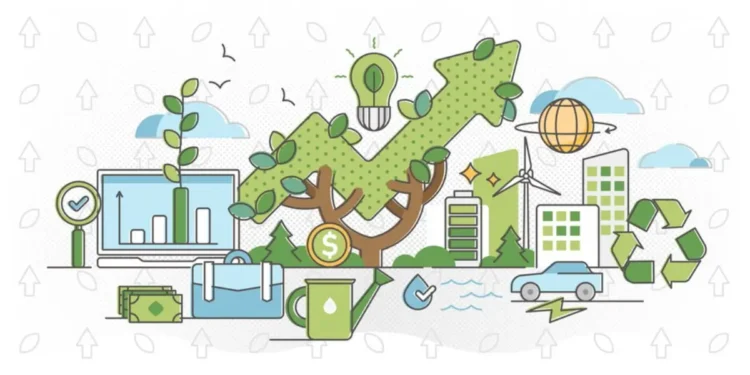Contents
- 1 Introduction
- 2 What Is Sustainability in Business?
- 3 Why Is Sustainability Important in Business?
- 4 Benefits of Business Sustainability
- 5 Examples of Sustainability in Business
- 6 How to Create a Sustainable Strategy
- 7 Corporate Sustainability Areas
- 8 Challenges with Business Sustainability
- 9 The Future of Business Sustainability
- 10 Business Sustainability and the Environment
- 11 Business Sustainability and Growth
- 12 Business Sustainability and Social Impact
- 13 Conclusion
Introduction
Business sustainability refers to a company’s deliberate efforts to minimize its negative environmental and social impact while ensuring financial viability over the long term. It’s about striking a balance between “people, planet, and profit.” This concept, often referred to as the “triple bottom line,” emphasizes that a company’s success shouldn’t be solely measured by its financial performance but also by its social and environmental responsibility.
Importance of Business Sustainability in Today’s World
In today’s world, business sustainability is no longer a fringe concept; it’s becoming increasingly crucial for a company’s long-term success. Here’s why:
- Environmental Concerns: Climate change, resource depletion, and pollution are pressing issues that consumers and investors are paying close attention to. Businesses with unsustainable practices face growing pressure and potential regulations.
- Shifting Consumer Preferences: Consumers are becoming more environmentally and socially conscious. They actively seek out and support brands that prioritize sustainability.
- Economic Benefits: Sustainable practices can lead to cost savings through reduced energy consumption, waste minimization, and improved resource efficiency. Additionally, companies with a strong sustainability reputation can attract and retain top talent and gain a competitive edge.
By embracing business sustainability, companies can not only contribute to a healthier planet and a fairer society but also ensure their own long-term prosperity.
What Is Sustainability in Business?
In simpler terms, sustainability in business means operating in a way that meets the needs of the present without compromising the ability of future generations to meet their own needs. This encompasses a variety of practices that consider the environmental, social, and economic impacts of a company’s operations.
Here are some key aspects of sustainable business practices:
- Environmental Responsibility: Minimizing a company’s environmental footprint by reducing energy consumption, using renewable resources, and managing waste effectively.
- Social Responsibility: Ensuring fair labor practices, diversity and inclusion within the workforce, and contributing positively to the communities where the business operates.
- Economic Sustainability: Prioritizing long-term financial stability through responsible resource management, innovation, and building strong customer relationships.
Essentially, a sustainable business strives to be a good neighbor to the environment, a responsible employer, and a valuable member of the community, all while maintaining a healthy bottom line.
Historical Context and Evolution
The concept of business sustainability has evolved over time. While early efforts focused on environmental regulations and compliance, the focus has shifted towards a more holistic approach that integrates social and economic considerations. Here’s a brief historical perspective:
- Early Regulations (1960s-1970s): The rise of environmental concerns led to regulations around pollution control and waste management. This marked the initial steps towards environmentally responsible business practices.
- Corporate Social Responsibility (1980s-1990s): The concept of corporate social responsibility (CSR) gained traction, encouraging businesses to consider the social impact of their operations beyond just legal compliance.
- Triple Bottom Line (1990s-Present): The concept of the triple bottom line (people, planet, profit) emerged, emphasizing the importance of integrating environmental, social, and economic considerations into business strategy.
Today, business sustainability is a continuous journey of improvement. Companies are constantly innovating and finding new ways to minimize their impact and maximize their positive contributions.
Why Is Sustainability Important in Business?

Business sustainability is no longer just a feel-good initiative; it’s a strategic imperative for several reasons:
Environmental Impact:
- Climate Change: Businesses are significant contributors to greenhouse gas emissions. Sustainable practices like using renewable energy and reducing energy consumption can help mitigate climate change and create a more sustainable future.
- Resource Depletion: Our planet’s resources are finite. Sustainable businesses prioritize resource efficiency, minimizing waste, and exploring ways to use renewable resources. This not only benefits the environment but can also lead to cost savings.
- Pollution Control: Unsustainable practices often lead to pollution of air, water, and soil. Businesses with strong sustainability practices implement measures to minimize pollution, protecting the environment and public health.
Economic Benefits:
- Cost Savings: Sustainable practices often lead to cost reductions. By using less energy and water, minimizing waste, and improving operational efficiency, businesses can save money in the long run.
- Increased Revenue: Consumers are increasingly willing to pay a premium for sustainable products and services. A strong sustainability reputation can attract new customers and boost brand loyalty.
- Market Opportunities: Sustainability is driving innovation in various sectors. Companies that embrace sustainable practices can gain a competitive edge and unlock new market opportunities.
Recommended: Green Energy Revolution: Second-Generation Biofuels Leading the Way
Social Responsibility:
- Employee Engagement: Sustainable businesses often have strong ethical values and social responsibility programs. This attracts and retains top talent who value working for a company that makes a positive impact.
- Community Development: Businesses can contribute positively to the communities they operate in by supporting local initiatives, investing in education, and promoting fair labor practices. This fosters goodwill and strengthens the brand’s reputation.
By prioritizing sustainability, businesses can address environmental challenges, generate economic benefits, and contribute to a more just and equitable society.
Benefits of Business Sustainability

There are numerous advantages for companies that embrace sustainable practices. Here’s a closer look at some key benefits:
Cost Savings and Efficiency:
- Reduced Energy Consumption: Sustainable businesses implement strategies to minimize energy use through energy-efficient equipment, operational changes, and investment in renewable energy sources. This translates to significant cost savings on electricity bills.
- Waste Management and Recycling: Minimizing waste generation and implementing effective recycling programs reduces waste disposal costs and potentially opens up revenue streams from selling recyclable materials.
- Resource Efficiency: Sustainable practices encourage companies to optimize resource usage throughout the supply chain. This reduces reliance on raw materials, leading to cost savings and improved resource security.
Improved Brand Image and Reputation:
- Consumer Preferences: Consumers are increasingly making purchasing decisions based on a company’s environmental and social responsibility. A strong sustainability reputation can attract and retain customers who value ethical practices.
- Positive Media Attention: Businesses recognized for their sustainability efforts often receive positive media coverage, further enhancing their brand image and reputation.
- Investor Confidence: Investors are increasingly looking at a company’s sustainability practices when making investment decisions. A strong sustainability track record can attract investors who prioritize responsible businesses.
Employee Satisfaction and Retention:
- Attracting Top Talent: Millennials and Gen Z, the largest workforce demographics, prioritize working for companies with strong sustainability values. Sustainable businesses are more likely to attract and retain top talent.
- Improved Employee Morale: Employees who feel their company is making a positive impact on the environment and society tend to be more engaged and have higher morale. This can lead to increased productivity and a positive work environment.
- Strong Company Culture: Sustainability initiatives can foster a strong company culture that values environmental and social responsibility. This creates a sense of purpose and pride among employees.
By implementing sustainable practices, businesses can not only improve their financial bottom line but also build a stronger brand, attract and retain top talent, and foster a positive work environment.
Examples of Sustainability in Business
Business sustainability is not just a theoretical concept; companies of all sizes are implementing innovative practices to minimize their environmental impact and create positive social change. Here are some real-world examples:
Case Studies of Successful Sustainable Businesses:

- Patagonia: This outdoor apparel company is a leader in sustainable practices. They use recycled materials in their products, prioritize ethical manufacturing, and actively advocate for environmental protection.
- Tesla: Tesla’s electric vehicles are revolutionizing the transportation industry by reducing reliance on fossil fuels. They also invest heavily in solar energy and battery storage solutions.
- Unilever: This multinational consumer goods company has set ambitious business sustainability goals, including reducing its environmental footprint and promoting social responsibility throughout its supply chain.
Small Business Initiatives:

- A local coffee shop can prioritize fair-trade coffee beans, compost coffee grounds, and offer reusable mugs to customers.
- A clothing boutique can source sustainable fabrics made from recycled materials and partner with local artisans.
- A web design agency can offer clients carbon-neutral website hosting options and partner with environmental organizations.
Corporate Sustainability Programs:

- Many large corporations have established comprehensive business sustainability programs. These programs typically include goals for reducing energy and water consumption, minimizing waste, and promoting diversity and inclusion within the workforce.
- Some companies also invest in renewable energy projects, support local environmental initiatives, and volunteer in their communities.
These examples showcase how businesses of all sizes can implement sustainable practices that benefit the environment, society, and their bottom line.
How to Create a Sustainable Strategy

Building a successful business sustainability strategy requires careful planning and implementation. Here’s a roadmap to guide businesses on this journey:
Assessing Current Impact:
- The first step is to understand your company’s current environmental and social footprint. Conduct an audit to assess your energy consumption, waste generation, water usage, and labor practices.
- Analyze your supply chain to identify potential areas for improvement in terms of sustainability.
Setting Sustainable Goals:
- Once you understand your baseline, set clear and measurable business sustainability goals. These goals should be ambitious yet achievable and aligned with your overall business strategy.
- Focus on specific areas where you can make the most significant impact, such as reducing energy consumption by 20% within a year or increasing the use of recycled materials in your products by 15%.
Developing an Action Plan:
- Develop a detailed action plan outlining specific actions you will take to achieve your business sustainability goals. The plan should include timelines, responsibilities, and resource allocation.
- Break down the plan into smaller, actionable steps to ensure progress and maintain momentum.
Measuring and Reporting Progress:
- Regularly measure your progress towards your business sustainability goals. Track key metrics such as energy consumption, waste reduction, and employee engagement.
- Communicate your business sustainability efforts transparently through annual reports, social media, and other communication channels. This builds trust with stakeholders and showcases your commitment to sustainability.
Here are some additional tips for creating a successful business sustainability strategy:
- Engage Stakeholders: Get buy-in from all levels of your organization, from leadership to employees. Involve stakeholders in the planning process to foster a sense of ownership and responsibility.
- Seek Collaboration: Partner with other businesses, NGOs, and government agencies to share best practices and leverage collective expertise. Collaboration can accelerate progress towards shared business sustainability goals.
- Embrace Innovation: Be open to new technologies and innovative solutions that can help you achieve your business sustainability goals. Continuous improvement is key to long-term success.
By following these steps and adopting a holistic approach, businesses can develop a robust sustainability strategy that contributes to a healthier planet, a more just society, and a thriving business.
Corporate Sustainability Areas

Now that we’ve explored the overall concept and benefits of business sustainability, let’s delve deeper into the specific areas companies can focus on:
Environmental Management:
- This core aspect of sustainability focuses on minimizing a company’s environmental footprint. Key strategies include:
- Reducing energy consumption through energy-efficient equipment and processes.
- Utilizing renewable energy sources like solar or wind power.
- Minimizing waste generation and implementing effective recycling programs.
- Conserving water resources through efficient water usage practices.
- Managing air and water pollution through emission control technologies and responsible waste disposal.
Social Responsibility:
- Businesses have a responsibility to operate ethically and contribute positively to society. This includes:
- Ensuring fair and safe working conditions throughout the supply chain.
- Promoting diversity, equity, and inclusion within the workforce.
- Respecting human rights and avoiding labor exploitation.
- Supporting local communities through philanthropic initiatives and volunteer programs.
- Engaging in ethical sourcing practices that minimize environmental and social harm.
Economic Sustainability:
- A sustainable business prioritizes long-term financial stability and growth. This can be achieved through:
- Implementing resource efficiency measures to reduce costs.
- Developing innovative and sustainable products and services.
- Building strong customer relationships and fostering brand loyalty.
- Managing risk effectively, including environmental and social risks.
- Investing in long-term solutions that ensure the company’s future viability.
By focusing on these three key areas – environmental management, social responsibility, and economic sustainability – businesses can create a comprehensive and integrated approach to sustainability. This holistic approach ensures a company’s success is not just measured by profit but also by its positive impact on the environment and society.
Challenges with Business Sustainability

While the benefits of business sustainability are undeniable, there are also challenges companies need to navigate:
Financial Constraints:
- Implementing sustainable practices can require upfront investments in new technologies, energy-efficient equipment, or sustainable materials. This can be a hurdle for businesses with limited financial resources.
Technological Barriers:
- Some sustainable practices require advanced technologies that may not be readily available or cost-effective for all businesses. Additionally, integrating new technologies into existing operations can be complex.
Regulatory Compliance:
- The regulatory landscape surrounding business sustainability is constantly evolving. Businesses need to stay updated on new regulations and ensure their practices comply with relevant environmental and social standards.
Market Competition:
- While consumer demand for sustainable products and services is growing, it can be challenging for businesses to differentiate themselves in a crowded marketplace. Businesses need to effectively communicate their sustainability efforts to stand out from the competition.
Shifting Consumer Preferences:
- Consumer preferences can change rapidly. Businesses need to be adaptable and constantly evaluate their sustainability efforts to ensure they remain relevant and meet evolving consumer expectations.
Internal Resistance:
- Implementing changes within an organization can be challenging. Some employees may be resistant to new practices or perceive sustainability as an added burden. Effective communication, training, and leadership buy-in are crucial to overcome internal resistance.
Despite these challenges, businesses that prioritize business sustainability are well-positioned for long-term success. Innovation, collaboration, and a commitment to continuous improvement can help businesses overcome these hurdles and achieve their sustainability goals.
The Future of Business Sustainability

The future of business is undoubtedly intertwined with sustainability. Here’s a glimpse into what we can expect:
Emerging Trends and Innovations:
- Technological advancements will play a key role in accelerating business sustainability progress. We can expect to see breakthroughs in areas like renewable energy generation, sustainable materials science, and resource efficiency technologies.
- Artificial intelligence (AI) and big data analytics will be increasingly used to optimize business sustainability efforts. AI can help businesses identify areas for improvement and predict environmental impact, while big data can provide valuable insights into resource usage and supply chain sustainability.
- The circular economy, which focuses on keeping products and materials in use for as long as possible, will gain traction. Businesses will design products with reusability and recyclability in mind, minimizing waste and resource depletion.
The Role of Technology:
- Technology will be a powerful enabler of sustainability. Cloud computing can help businesses reduce their energy footprint by optimizing data center operations. Blockchain technology can enhance supply chain transparency and ensure ethical sourcing practices.
- Digital tools will empower consumers to make informed choices about sustainable products and services. Transparency platforms will allow consumers to track a product’s environmental and social impact throughout its lifecycle.
Predictions for the Next Decade:
- Sustainability will become a core business strategy, not just an add-on initiative. Companies that prioritize sustainability will attract top talent, secure financing more easily, and gain a competitive edge.
- Regulations around sustainability are likely to become stricter, pushing businesses to adopt more sustainable practices.
- Consumer demand for sustainable products and services will continue to grow, creating opportunities for businesses that cater to this market segment.
Recommended: The Green Side of Crypto | Environmental Concerns and Solutions | A Comprehensive Guide
Business Sustainability and the Environment

Reducing Carbon Footprint:
- Businesses are major contributors to greenhouse gas emissions through their operations, transportation, and energy consumption. A crucial aspect of business sustainability is actively working to reduce their carbon footprint. Here’s how:
- Implementing energy-efficient practices throughout the company, from buildings to equipment.
- Investing in renewable energy sources like solar, wind, or geothermal power.
- Optimizing transportation logistics and exploring sustainable options like electric vehicles.
- Offering remote work options to employees to reduce commuting emissions.
Waste Management and Recycling:
- Businesses generate a significant amount of waste. Sustainable practices focus on minimizing waste generation and implementing effective recycling programs. This can be achieved through:
- Designing products with minimal packaging and using recycled materials whenever possible.
- Implementing robust recycling programs for paper, plastic, metal, and other materials.
- Exploring opportunities for composting food waste or finding creative ways to reuse materials.
Sustainable Resource Use:
- Businesses rely on various resources throughout their operations. Sustainable practices promote responsible resource use by:
- Conserving water through efficient irrigation practices and leak detection in facilities.
- Using sustainable forestry practices if wood products are involved in the business.
- Sourcing materials from responsible suppliers who prioritize environmental sustainability.
- Exploring ways to use renewable or recycled resources whenever possible.
By implementing these strategies, businesses can minimize their environmental impact and contribute to a healthier planet for future generations.
Business Sustainability and Growth

The misconception that sustainability hinders profitability is fading fast. In reality, business sustainability can be a powerful driver of growth:
Sustainable Business Models:
- Many companies are developing innovative business models that prioritize environmental and social responsibility alongside financial success. These models often create new market opportunities and generate positive social impact.
- Examples: Companies offering subscription services for reusable products or businesses developing plant-based alternatives to traditional products.
Long-term Profitability:
- Sustainable practices can lead to long-term cost savings by reducing energy consumption, minimizing waste, and improving resource efficiency. This translates to increased profitability over time.
- Additionally, businesses with a strong sustainability reputation attract and retain top talent, which can lead to increased innovation and productivity.
Competitive Advantage:
- Consumers are increasingly making purchasing decisions based on a company’s environmental and social responsibility. A strong sustainability reputation can differentiate a business from competitors and attract a loyal customer base.
- Businesses that embrace sustainability can also gain a competitive edge by developing innovative sustainable products and services that cater to the growing demand for eco-friendly solutions.
By adopting sustainable practices, businesses can not only secure long-term financial success but also position themselves as leaders in a competitive market that prioritizes environmental and social responsibility.
Business Sustainability and Social Impact

Businesses have the power to create positive social change beyond their core operations. Here’s how sustainability practices can contribute to a more just and equitable society:
Community Engagement:
- Businesses can play a vital role in supporting the communities where they operate. This can be achieved through:
- Partnering with local organizations on social initiatives like education programs or environmental restoration projects.
- Supporting local businesses and entrepreneurs, fostering economic development within the community.
- Investing in infrastructure and community services that benefit everyone.
Ethical Labor Practices:
- Sustainable businesses prioritize fair and ethical treatment of workers throughout their supply chains. This includes:
- Ensuring safe working conditions and fair wages for all employees, including those in overseas factories.
- Avoiding child labor and other exploitative practices.
- Promoting diversity, equity, and inclusion within the workforce.
Philanthropy and Volunteerism:
- Businesses can contribute to positive social change through philanthropic initiatives and employee volunteer programs. This allows companies to:
- Support causes they care about, be it environmental protection, social justice, or poverty alleviation.
- Encourage employee engagement and foster a sense of purpose within the company.
- Build stronger relationships with the communities where they operate.
By taking an active role in social issues, businesses can contribute to a more equitable world and build a positive reputation as a responsible corporate citizen. This fosters trust and goodwill with stakeholders, ultimately strengthening the company’s social impact.
Conclusion
In conclusion, business sustainability is no longer a peripheral concept; it’s essential for long-term business success. By minimizing environmental impact, prioritizing social responsibility, and ensuring economic viability, companies can contribute to a healthier planet, a more just society, and their own long-term prosperity.
The future of business belongs to those who embrace sustainability. By taking action today, businesses can become responsible leaders, create positive change, and secure a thriving future for themselves and generations to come.













